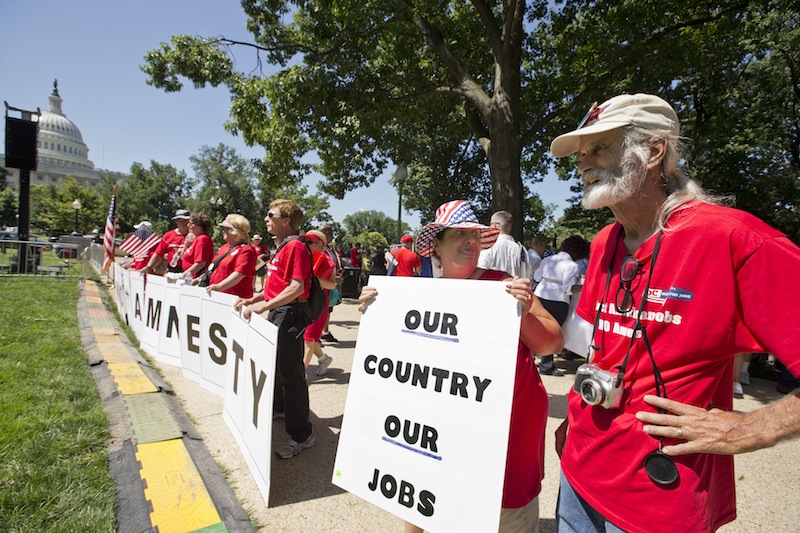House Republicans have been subtly angling for months to quash immigration reform. But after getting rolled by Democrats in the spending and shutdown fights, conservatives who call the shots in the chamber are more determined than ever to block an overhaul and imperil President Barack Obama’s second-term priority.
The government shutdown fight has given House conservatives a new pretext: Obama refused to deal with us on the debt, so we won’t deal with him on immigration reform.
“I know the president has said, well, gee, now this is the time to talk about immigration reform,” Rep. Aaron Schock (R-IL) told TPM. “He ain’t gonna get a willing partner in the House until he actually gets serious about … his plan to deal with the debt.”
And a new talking point: Obama simply wants to use immigration reform to “destroy” the GOP.
“I think it’d be crazy for the House Republican leadership to enter into negotiations with him on immigration,” Rep. Raul Labrador (R-ID) told reporters on the eve of the GOP’s shutdown surrender. “And I’m a proponent of immigration reform. So I think what he’s done over the last two and a half weeks — he’s trying to destroy the Republican Party. And I think that anything we do right now with this president on immigration will be with that same goal in mind: which is to try to destroy the Republican Party and not to get good policies.”
Labrador, a former immigration lawyer, has influence among House conservatives. He was an original member of a bipartisan House group working on the issue until he bolted in June over differences regarding a pathway to citizenship and whether or not provisionally legalized immigrants should receive health care subsidies while waiting to become citizens.
That’s the unreceptive audience Obama’s remarks were directed at when he vouched for immigration reform again on Thursday, the morning after Congress acted to re-open the government and avert a catastrophic debt default.
“There’s already a broad coalition across America that’s behind this effort of comprehensive immigration reform — from business leaders to faith leaders to law enforcement. In fact, the Senate has already passed a bill with strong bipartisan support,” the president said. “And it’s sitting there waiting for the House to pass it. Now, if the House has ideas on how to improve the Senate bill, let’s hear them. Let’s start the negotiations. But let’s not leave this problem to keep festering for another year, or two years, or three years. This can and should get done by the end of this year.”
Earlier this month, House Minority Leader Nancy Pelosi (D-CA) introduced a sweeping immigration bill similar to what the Senate passed in June. Democrats rallied around it. The move was designed to pressure Republicans and highlight the contrast between the parties.
Speaker John Boehner (R-OH) wants immigration reform and can probably pass the bipartisan Senate-approved bill if he permits a House vote and lets Democrats carry it to victory. But he has promised his members he won’t do that and he’ll let them pursue their own course. That means a path to citizenship for those living in the country illegally is probably dead, and with it any prospect of holding together support from Democrats and the fragile constituencies.
“I very recently had a conversation with the Speaker, and if immigration reform moves it’s going to move piecemeal,” Rep. Matt Salmon (R-AZ) said Wednesday. “And it will go over one bill at a time and if there’s any kind of a conference it’ll be on specific bills that we send over. It will not be on the [Senate-passed] ‘gang of eight’ bill.”
Meanwhile, House Judiciary Chairman Bob Goodlatte (R-VA), who has jurisdiction over immigration policy, has publicly declared his opposition to a path to citizenship for unauthorized immigrants — even DREAMers, a term used for those brought to the country as children. Instead he supports what he calls “earned” citizenship, which means giving them legal status without the promise of eventual citizenship and letting them pursue permanent residency through the regular channels (which would be a dead end for many, if not most).
“I wouldn’t give them what I would call a special pathway to citizenship,” the Republican chairman said last month at a GOP event celebrating Hispanic Heritage Month. “I would give them an earned pathway to citizenship.”
It may seem cause for hope that Boehner broke the so-called Hastert Rule this week by permitting a vote on the government funding and debt limit bill without strong GOP support — as he has with the fiscal cliff, Violence Against Women Act and Hurricane Sandy aid. But there’s a crucial difference: each of those situations contained dire economic or political consequences if Boehner didn’t permit a vote. And each time the Speaker had to go through a long, drawn out process to show he fought for the hard right until there was no other option.
Immigration reform is another matter. Apart from a few who represent significant Hispanic populations, and conservatives like Rep. Paul Ryan (R-WI) who have national ambitions, the Republican base vigorously opposes “amnesty” for people living in the U.S. illegally. Boehner would have a harder time justifying a snubbing of conservatives, especially when they believe reform will harm, not help, the GOP and when distrust for Obama is at an all-time high.
“I don’t see how he would in good faith negotiate with us on immigration reform,” Labrador said.






